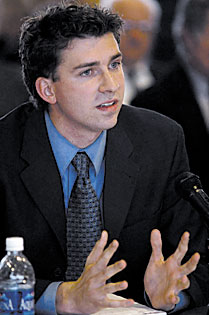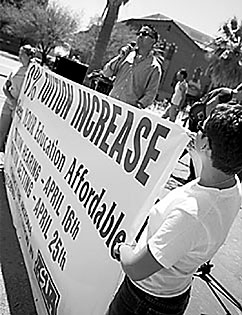Student president's proposals rejected
 |
|
DAVID HARDEN/Arizona Daily Wildcat
|
ASUA president Doug Hartz gestures at the Arizona Board of Regents meeting yesterday at ASU in Tempe. Hartz proposed an alternate tuition plan that was rejected by the Regents.
|
|
By Keren G. Raz
Arizona Daily Wildcat
Friday March 7, 2003
TEMPE ÷ Doug Hartz has had a long week.
In four days the UA student body president has seen his fall break proposal, the centerpiece of his presidential campaign, take fire from the Faculty Senate and his tuition proposal rejected by the Arizona Board of Regents.
Yesterday he had to admit defeat when the regents voted 9-0 in favor of President Pete Likins' tuition proposal over his.
He couldn't believe it.
After long days that often left him at the office past midnight drafting a tuition proposal, Hartz was confident that he had found the best proposal for students.
With state funding cuts crippling the UA, Hartz took a different approach to tuition than his predecessors, who almost automatically favored no tuition increase.
He asked for a $900 increase for resident undergraduates and a $1,450 increase for nonresident students that would have generated $770,000 more in financial aid than Likins' proposal.
"An extra $770,000 in aid would have made a big difference for a lot of students," Hartz said.
He struggled to come to grips with what he considered a blow to needy students, a blow that he said came down to him from the regents with no explanations.
"I just wish we could have heard the reason why our proposal was inferior to the president's," he said.
Before student Regent Matthew Meaker and Regent Gary Stuart made a joint motion to approve the Likins' requests for tuition, they gave Hartz the opportunity to present his proposal.
The criticism was minimal as regents and Likins chose to praise Hartz's efforts instead.
"Doug, I appreciate all your hard work, you certainly gave me something to think about," Meaker said.
Hartz's efforts met a similar response at the Faculty Senate meeting on Monday when he asked them to support his proposal to create a week- long Thanksgiving break.
He stood before the Faculty Senate in a white dress shirt and tie backed by a Power Point presentation.
Senators said they admired Hartz's efforts, and then fired criticism at the proposal.
"I want to express my appreciation for Doug and the work he's done," said John Willerton, associate professor of political science. "Having said this, I completely oppose this (proposal)."
Hartz stood calmly as faculty members deconstructed his fall break proposal, saying they could never support it.
Hartz takes little solace in the praise he has received for both his fall break proposal and his tuition proposal, but he hopes that the respect he has earned from administrators will change the way student leaders and administrators work together.
Likins said it already has.
He praised not only Hartz, but also lobbyists Melanie Rainer, Ryan Patterson and Nick Green for earning his respect with what he considered well thought-out proposals.
One year ago, administrators and students fought over how much to raise tuition. Students wanted no tuition increase while Likins wanted a $300 increase.
"It began with students not acknowledging the need for a tuition increase at all," Likins said at yesterday's meeting. "The contrast with this student administration is amazing."
That 15-year history of contention with students demanding no tuition increase might have made it difficult for regents to take the student lobbyists' proposal seriously, Hartz said.
"It's hard to believe somebody would come with a different perspective," he said. "But we've gained respect, so hopefully next year there will be much more inclusion in the process."
But for now that thought toward the future matters little to Hartz, who is discouraged that students won't be getting as much financial aid as he had hoped.
"But the school will be better off next year, and that's something to fall back on," he said.
The Likins-era Tuition Battle
1997
Pete Likins is inaugurated president of the UA.
1998
After divisive debates, regents settle on a 5 percent increase.
"What's fair to students is not necessarily what's best for students," said UA President Peter Likins during the tuition setting process, where he pushed for regents to set aside money for financial aid.
1999
The state legislature confirms plans to abandon a controversial bill that would cap tuition increases at Arizona's public universities.
2000
At a board of regents meeting, Likins reaffirms his stance on tuition and financial aid.
"Eventually, something will break and either the state will come forward with more funds, or tuition will rise more rapidly," he said.
 |
|
|
2002: Student lobbyists say no to Likins' tuition increase.
|
|
2002
Student lobbyists and administrators present opposite plans. Students want a so-called "zero percent" increase. Likins wants a $300 in-state increase and a $1,000 out-of-state increase.
"It's not students' responsibility to be paying for downfalls of the state and the Legislature," then Student Body President Ray Quintero said.
Torn, regents settle on an increase just under $100 for in-state students.
2003
In a major shift from past years, student lobbyists and administrators sit at the same table, drafting similar proposals with a focus on accessibility through financial aid.
Former student lobbyist Jenny Rimsza, who fought hard against an increase the year before, changes her stance.
"A tuition increase is in the best interests of students at the university as long as it's coupled with a significant increase in financial aid," she says.
Student Body President Doug Hartz puts his focus on freeing up money for financial aid.
"I'm concerned about making it easier for students and particularly needy students to attend the institution than before the increase," Hartz says.
Something to say? Discuss this on WildChat
|

